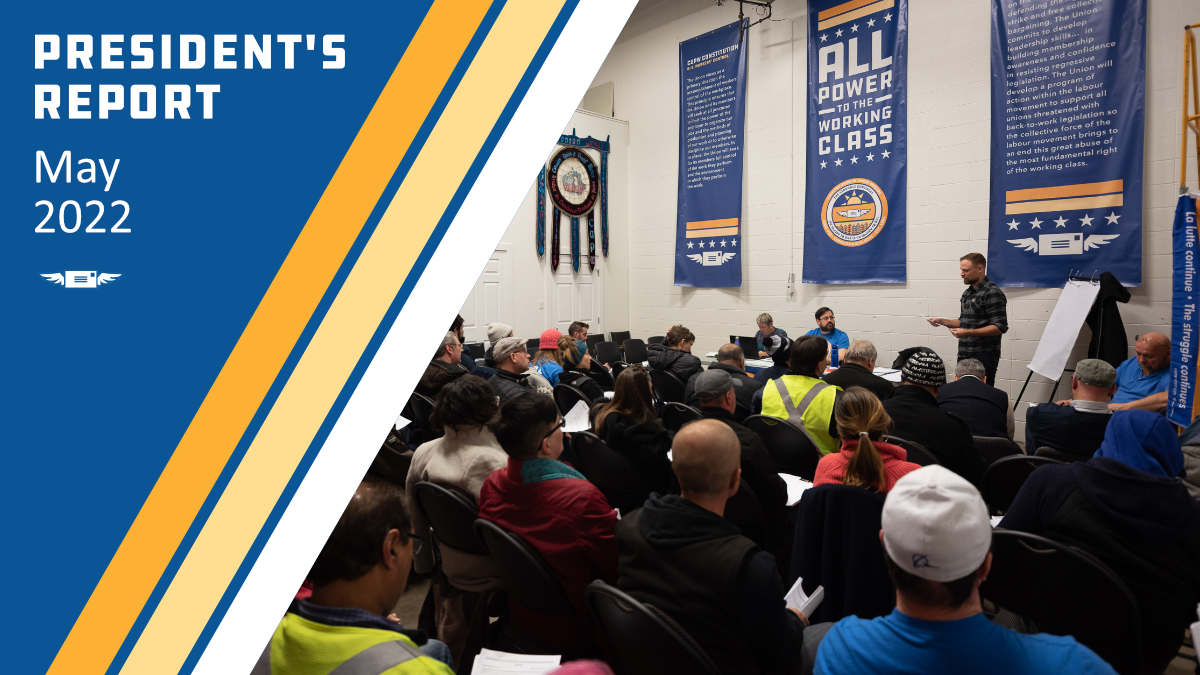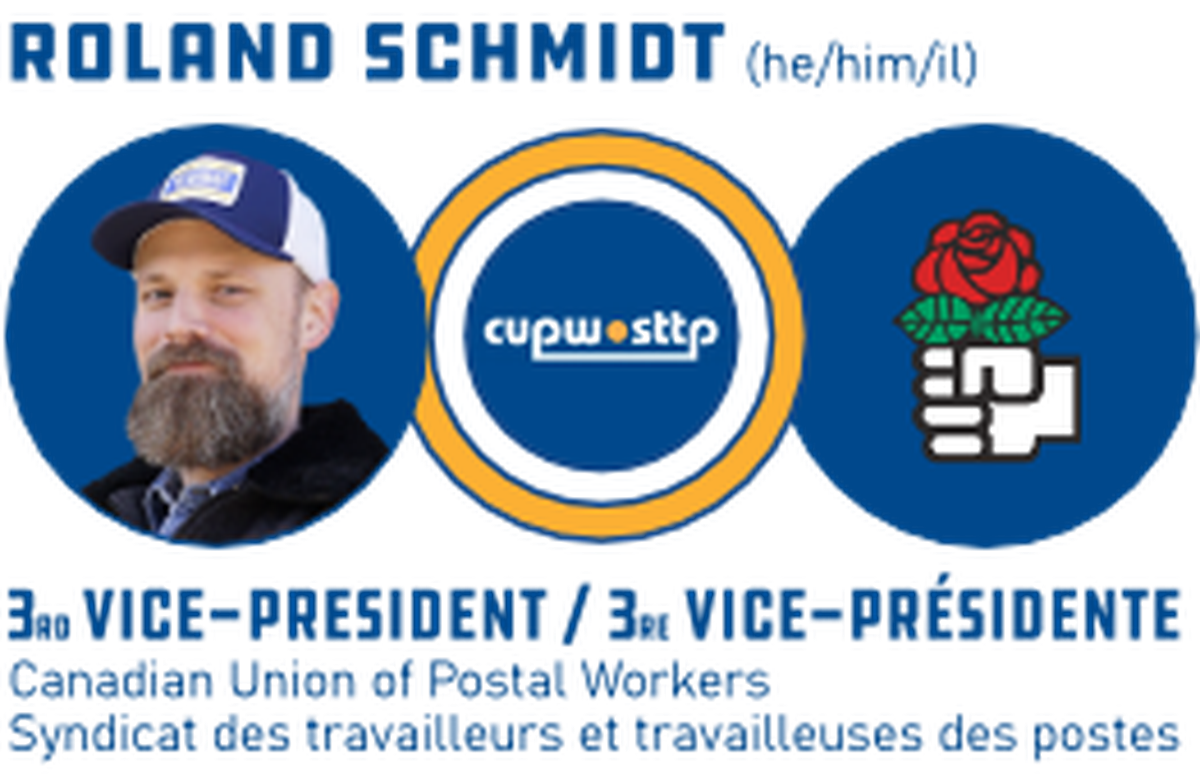
Due Process: We Only Get What We Are Willing To Give
(22.05.02 Update: This report was given while I was still Local President prior to a motion being debated about reducing our Local dues by $36/year, which would have cost the Local at least $60,000/year. This motion would be the third attempt in three years to reduce our dues under the questionable pretense of “supporting financially struggling members”. For record, each of these motions were defeated. The first one (Sept 2019) was obliterated 107 to 9. The latest attempt was presented to 71 members at the May 2022 GMM and needed a ⅔ majority of 47 votes to pass but only managed 29. )
Comrades & friends, Happy International Day of the working class! Although not celebrated to the same extent in North America as the rest of the world, it is important for us to reflect on why unions are important and how the labour movement can make the world a better, more just, place. It’s an exciting time for labour as public sentiment is losing patience with the rich getting historically richer than ever before, all in the context of a global pandemic. Exemplifying this class tension, one of the biggest companies in the world, Amazon, owned by the world's richest person, is now facing successful unionization drives. What the labour orthodoxy couldn’t do in 28 years with tens of millions of dollars, deploying an army of staffers, was accomplished by dozens of rank-and-file volunteer organizers in their own facility with only $150,000. Change is possible, but only by breaking free of methods unable to adapt to the attacks from the ruling class over the past 40 years.
Time has been cruel to all workers, especially those that are non-unionized. Using market-equivalent delivery/logistics positions as an example, you could get hired tomorrow just outside Edmonton as an Amazon warehouse worker or delivery driver for between $17-19/hour ($39, 520/year). Conversely, the wage of a CUPW letter carrier or plant worker tops out around $29/hour ($60,320/year). Neither wage keeps pace with inflation or the absurdities of an unregulated housing market (Edmonton housing prices have skyrocketed 353% since 1981), but the union advantage is clear: we make much more in wages and benefits than our non-unionized comrades. Digging deeper into the numbers it is clear just how necessary it becomes for all workers to win collective representation so we can create more leverage to balance the rest of society.
There are two main reasons our unorganized comrades, like those working for Amazon in Alberta, are suffering more than CUPW members. The first relates to leverage that workers can wield: between 1981 and 2021, the rate of unionization in the USA dropped from 20% to 10.3%. In contrast, Canada sank 37% to 30%. Less unionization means workers are less able to force wealthy companies like Amazon to redistribute their wealth to those that are responsible for the creation of that wealth. The second main reason is that companies have become more sophisticated in their anti-union campaigns. For example, Amazon spent $4.3million in 2021 to scare workers about the cost of union dues.
Individual VS. Collective Power
In Alberta, we are especially familiar with politicians peddling ring wing populist rhetoric trying to trick workers into dismantling our public services in exchange for short-term rebates. It’s like Ralph Klein cutting back our public healthcare and literally blowing up hospitals to give each Albertan a $200 cheque. Sadly, we Albertans fell for it, time and again, which is one of the contributing factors why we’ve long lived in the most anti-worker province in Canada. This exploitative rhetoric is identical to criticisms leveled against paying dues.
A struggle for unions has been their willingness to confront the confusion expressed by their members about dues and be honest about what is exactly at stake by not paying them. Infamously, instead of just paying their workers more, Delta Airlines bankrolled an anti-union campaign claiming that instead of unionizing and paying $700/year in dues, their workers could buy a new video games system and be better off. At face value this seems tempting and tries to stir up people's fears and individual desires; but past the surface this argument is absolutely absurd for how short-sighted it is.
Going back to the CUPW/Amazon example you can see the direct consequences of what not paying dues means. At Amazon a worker will make at least $6,739 less of starting wage than CUPW, with a much lower wage ceiling. On top of that, an Amazon worker will collect approximately $10,000 less in benefits due to no pension and considerably less extended health, short term disability, and dental coverage, as well as less escalating leave provisions. Alternatively, after deducting $1200/year in CUPW dues, our collective leverage is able to win our members roughly $15,500 more in wage and benefits value. This is before even taking into account all the extra invaluable things a union will do like elect full time officers to administer a union, keep members informed, enforce oversight on route restructures to mitigate job loss, protect members in disciplinary hearings and, most importantly, run educational programs to train members how to empower their own workfloors. And on and on and on.
Guaranteed Returns
Every dollar you spend in dues as a CUPW member nets you close to $13 in value you would not get as a comparable non-union worker. If you could be legally guaranteed that, no matter what, for an investment of $1200 a year you would receive at least an additional $15,500 a year in value, you would take that opportunity every time and even ask how you could contribute more. Dues are the symbolic lifeblood of the workers' struggle to create a better world and we only get what we put in. For example, if our local decided to pay a total $125 in dues a month, or $144 a year more than what we already pay, we could elect three new officers for the letter carriers, EMPP and RSMCs to exclusively oversee representation, grievance hearing, consultations, activist recruitment and steward mentorship on a full time basis for each classification. Any union or local that did something like this would drastically increase its strength by creating more opportunities to share knowledge and recruit more activists. No wonder companies will spend millions of dollars to keep unions from getting a foothold in their operations. In the end, our power is not limited as much by the boss as it is by our own ambition and willingness to invest in our own organization to strengthen it to fight.
At today’s GMM, our membership will have an important debate on the direction of our Local. Do we give our members an extra $36 dollars a year or do we spend around $60,000 to create more services to grow our Local and support our members? In these matters, the membership is always right because they always get what they ask for. If our members do not support an attempt by their leadership to better support and service them they will say so while also accepting what they are giving up. We can’t have it both ways. The debate today encapsulates the overarching struggle of individual interests vs collective power. We’ll see what the members have an appetite for.
Resolution
Since January, Rashpal and I, along with Karry and Elizabeth for one case, have been dedicating a lot of time arranging for mediation opportunities for members previously involved in the union that, for whatever reason, have strayed or developed hard feelings toward the Local sometime over the past 15 years. Although many of these tensions originated well before our leadership group was elected into the office, we feel it is important to try to repair those bridges so we can focus our fight on the boss and not each other. Out of the 20 people we had originally identified for mediation, we’ve had positive breakthroughs with 5, a mostly constructive arrangement with 1, and are trying to schedule sessions for 4 more. As slow as this process is, we are doing our best to the extent that the other parties are willing. Considering the big picture, a few months to make these meetings happen is a very small amount of time compared to the 15 or so years some of these animosities have been festering.
Finally, on a personal note that may have implications for our Local, I wanted to clarify what happens if I am to be elected as the CUPW National 3rd Vice-President of Organizing at the special conference on May 6. As I stated in a past email dispatch, I officially committed to running for the position on April 14. I feel just as reluctant running for this position as when I first ran for Local President, but I'm ultimately doing it because our entire union needs to get serious about properly organizing our workfloors, and no one else with actual experience coordinating job actions or training workfloor organizer is stepping up.
If I win, I have to relocate to Ottawa by June as well as immediately resign as Local President to be sworn in as National 3rd VP. Then, Devon (as Local 1st VP) will assume Local President duties until the Election Committee holds an election for the vacancy. I’ll remain a member of the local and continue attending GMMs as long as they are run virtually. If I lose, nothing changes. Either way, the local will continue to run smoothly.
I really don't want to leave Edmonton, but we need to get more locals on board with an organizing-first strategy if we're going to turn this ship around. If elected, I could absolutely do that with a National platform. Regardless if I leave or not, I remain committed to making myself available to help with the ongoing mediation attempts. If this is to be my last GMM as your President, I thank all of you that supported me in trying to grow our Local into an actual fighting organization and look forward to expanding our work to other locals so CUPW can develop the strength necessary to start winning again. No struggle, no victory.
(22.05.06 Update: I was elected to the National CUPW position of 3rd Vice-President.)
In solidarity,
